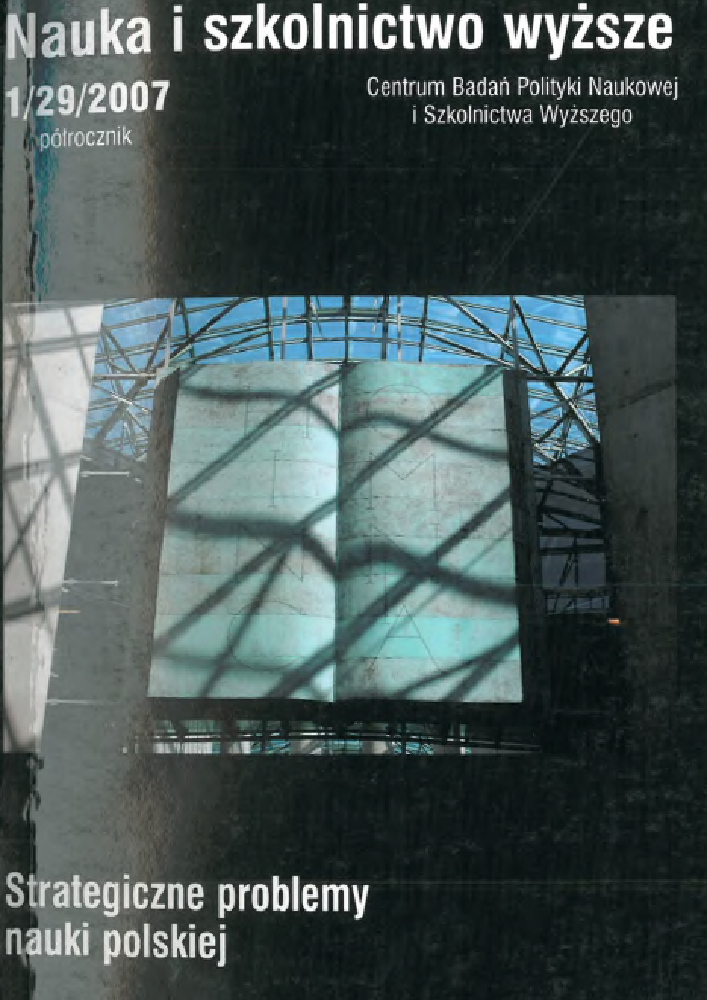Abstract
The author ponders over institutional redefinition of universities operating on the international education market. In his opinion, institutional transformation is the key competitive advantage of a university in the ever faster changing environment. The problem of institutional transformation is considered in two contexts: on the one hand, as ‘historical necessity’ which the managements of universities must tackle (the context of internationalisation or the Bologna process appear here as necessary, ‘statutory’ aspects of transformation). On the other hand, institutional transformation is considered as a creative management process: conscious, based on knowledge and understanding of market-driven management to prevent universities from turning into brick-and-mortar backwater. In this context, institutional transformation appears as market strategy, less or more effective, based largely on trial and error rather than any ‘golden mean’. The author refers to two models: a Humboltian university and the American concept of entrepreneurial university. In his opinion, both models co-exist in contemporary higher education, and we are witnessing clashing arguments and views elevating the former while simultaneously discrediting the other. The author does not intend to propose a final resolution of this dispute, and any authoritative assertions made earlier than two years in advance may be perceived as charlatanry. Moreover, another vision of university has appeared on the horizon, labelled ad hoc as ‘knowledge-based university’. The author’s intent was to identify trends, more or less advanced, in increasingly commercialised higher education: globalisation and regionalisation of universities with parallel departure from the model of national universities; decentralist transformations of university structures; relations between universities and industry; competitive pressure from other players active in the education sector.
References
Biały K. 2006 Szkolnictwo wyższe w Polsce w warunkach rynkowych a proces budowy społeczeństwa opartego na wiedzy-kilka uwag krytycznych, „Nauka i Szkolnictwo Wyższe”, nr 2/28.
Cielicki W. 2006 Project Management platformą komunikacji szkól biznesowych z organizacjami rynkowymi, „Master of Business Administration”, nr 5.
Davies J.L. 1998 The Public Role of the University: The Dialogue of Universities with Their Stakeholders: Comparison between Different Regions of Europe, The European Rectors Conference (CRE), Strasbourg.
Drucker R 1999 Społeczeństwo pokapitalistyczne, przekład G. Karnas, Wydawnictwo Naukowe PWN, Warszawa.
Drucker R 2000 Zarządzanie w XXI wieku, przekład B. Kacprzyńska, Muza SA, Warszawa.
Drucker R 2002 Myśli przewodnie Druckera, przekład A. Doroba, Wydawnictwo MT Biznes, Warszawa.
Framework... 1998 Framework for Priority Action for Change and Development of Higher Education, UNESCO, Paris.
Kobylarek A. 2005 Redefinicja funkcji szkół wyższych z punktu widzenia interesów lokalnych (teoria mostu), „Nauka i Szkolnictwo Wyższe”, nr 2/26.
Kozyr-Kowalski S. 2005 Uniwersytet a rynek, Wydawnictwo Naukowe Uniwersytetu im. Adama Mickiewicza, Poznań.
Koźmiński A.K. 2004 Zarządzanie w warunkach niepewności. Podręcznik dla zaawansowanych, Wydawnictwo Naukowe PWN, Warszawa.
Kwiatkowski S. 2001 Szkoły wyższe - przykład organizacji nieinteligentnych?, w: Tworzenie organizacji, praca zbiorowa, Wydawnictwo Wyższej Szkoty Przedsiębiorczości i Zarządzania im. Leona Koźmińskiego, Warszawa.
Leja K. 2003 Instytucja akademicka. Strategia, efektywność, jakość, Wydawnictwo Gdańskie Sp. z o.o., Gdańsk.
Leja K. 2006 Uniwersytet: tradycyjny - przedsiębiorczy - oparty na wiedzy, „Nauka i Szkolnictwo Wyższe”, nr 2/28.
Morawski R.Z. 1999 Kryteria funkcjonowania instytucji akademickich, w: J. Woźnicki (red.): Model zarządzania publiczną instytucją akademicką, Instytut Spraw Publicznych, Warszawa.
Morawski W. 1999 Zmiana instytucjonalna, Wydawnictwo Naukowe PWN, Warszawa.
Nalepka A. 2001 Struktura organizacyjna, Wydawnictwo Antykwa, Kraków.
Neave G., Van Vught F.A 1991 Prometheus Bound. The Changing Relationship between Government and Higher Education in Western Europe, Oxford.
Nosowski W. 1999 Struktury organizacyjne zachodnioeuropejskich instytucji akademickich, w: R.Z. Morawski (red.): Efektywność funkcjonowania zachodnioeuropejskich instytucji akademickich, Instytut Spraw Publicznych, Warszawa.
Prawo... 2005 Prawo o szkolnictwie wyższym, Ustawa z 21 lipca 2005 r., DzU 2005, nr 164, poz. 1365.
[The] Response... 1999 The Response of Higher Education Institutions to Regional Needs, OECD, Paris.
Rola... 2003 Rola uniwersytetów w Europie wiedzy, Komisja Europejska, Bruksela (http://www.menis.gov.pl/wspolpraca/unia_europejska/rolauniw.php).
Samorządy... 2007 Samorządy w Unii Europejskiej, Urząd Komitetu Integracji Europejskiej, Warszawa.
Sauerland K. 2006 Idea uniwersytetu - aktualność tradycji Humboldta?, „Nauka i Szkolnictwo Wyższe”, nr 2/28.
Soto H. de 2003 Tajemnica kapitału, przekład Sz. Czarnik, Fijor Publishing, Warszawa.
Thorens J. 2006 Liberties, Freedom and Autonomy: A Few Reflections on Academia’s Estate, „Higher Education Policy”, 1.19, nr 1.
Wnuk-Lipińska E. 1993 Jakość w szkolnictwie wyższym - mechanizmy oceny, „Nauka i Szkolnictwo Wyższe”, nr 1.
